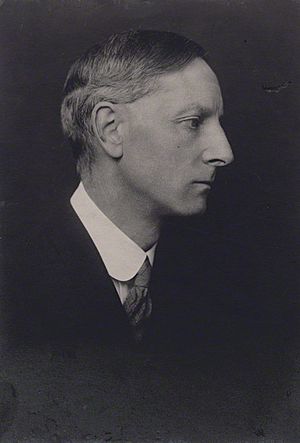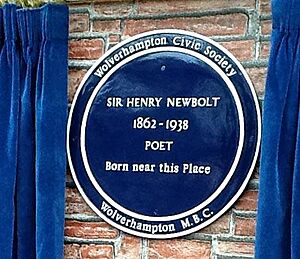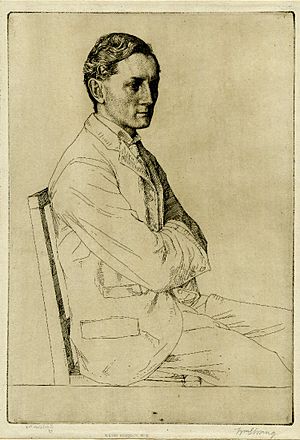Henry Newbolt facts for kids
Quick facts for kids
Sir Henry John Newbolt
|
|
|---|---|
 |
|
| Born | 6 June 1862 Bilston, Staffordshire, England |
| Died | 19 April 1938 (aged 75) Kensington, London, England |
| Occupation | Poet |
| Nationality | English |
| Notable works | "Vitaï Lampada" "Drake's Drum" |
Sir Henry John Newbolt (born June 6, 1862 – died April 19, 1938) was an English poet, writer, and historian. He is best known for his famous poems "Vitaï Lampada" and "Drake's Drum." He also worked as an advisor for the government, helping to shape how English was taught in England.
Contents
Who Was Henry Newbolt?
Henry John Newbolt was born in Bilston, which is now part of Wolverhampton. His father, Henry Francis Newbolt, was a church leader. After his father passed away, Henry and his family moved to Walsall, where he went to school.
Henry's School Days
Henry Newbolt went to Queen Mary's Grammar School, Walsall and Caistor Grammar School. He was a very bright student and won a special scholarship to attend Clifton College. At Clifton, he was a top student and even helped run the school's magazine.
After Clifton, he went to Corpus Christi College, Oxford, a famous university. In 1887, he became a lawyer, working in that field until 1899.
His Family Life
Henry Newbolt married Margaret Edwina Duckworth. Her family was well-known for publishing books. They had two children:
- A son named Arthur Francis Newbolt.
- A daughter named Margaret Cecilia Newbolt.
The Newbolt family lived in Kensington, London, for many years.
War, Writing, and Awards
When World War I started, Henry Newbolt joined more than 20 other British writers to help the government. They worked for a group called the War Propaganda Bureau. This group was created to share information and keep public support for Britain during the war.
Later, he became in charge of wireless and cable communications for the Foreign Office. He wrote poems about the war, including "The War Films." This poem was published in The Times newspaper and aimed to help people understand the powerful images they saw in films about battles like the Battle of the Somme.
Henry Newbolt was recognized for his work and was knighted in 1915, which means he received the title "Sir." In 1922, he was given another special award called the Companion of Honour.
In the late 1920s, he also worked as an editor for a series of classic books.
The Newbolt Report on English Teaching
In 1921, Henry Newbolt wrote an important report for the government called "The Teaching of English in England." This report was a big deal because it set up the basic ideas for how English should be studied and taught in schools today.
The report suggested a list of important English books and writers that students should learn about. It also argued that English should be the main language and literary standard across the entire British Empire. For many years, this report was a key guide for teachers training to teach English.
Later Life and Legacy
Sir Henry Newbolt passed away in London on April 19, 1938, when he was 75 years old. He is buried in a churchyard in Somerset.
In his hometown of Bilston, a local pub was named after him. There is also a special blue plaque near where he was born, which is a sign that marks places where famous people lived or worked.
Some of Henry Newbolt's poems were even turned into songs by a composer named Hope Squire. In 2013, there was a campaign to build a statue to honor him in Bilston.
You can even hear Henry Newbolt himself reading some of his poems! Recordings were made on old records called 78rpm sides.
Famous Works by Henry Newbolt
Henry Newbolt wrote many different types of works, including:
- Mordred: A Tragedy – a play about King Arthur.
- Admirals All (1897) – a collection of poems, including "Drake's Drum."
- The Sailing of the Long-ships and Other Poems (1902)
- The Old Country (1906)
- The New June (1909)
- Aladore (1914) – a novel.
- St George's Day & Other Poems (1918)
- Devotional Poets of the XVII Century (1929)
- The Naval History of the Great War: Based on Official Documents – he helped finish this history of the navy during World War I.
- A Ballad of Sir Pertab Singh
- He Fell among Thieves – about an explorer named George Hayward.
- Story of the Oxfordshire & Buckinghamshire Light Infantry – a history of army regiments.
- A Child is Born (1931)
- My World as in My Time (1932) – his autobiography, telling his life story.
- A Note on the History of Submarine War
- Submarine and Anti-Submarine (1919)
Images for kids




